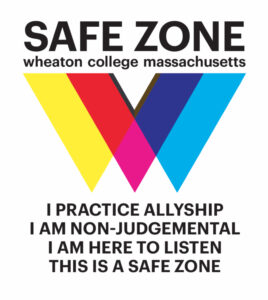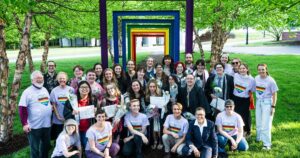The Marshall Center is dedicated to offering a wide range of educational, extracurricular and support resources framed around LGBTQ+ inclusion, support and advocacy. From educational training sessions and student organizations to Lavender Celebration and other large-scale collaborative events, we strive to make our campus an inclusive space for all students.
We welcome all Wheaton community members and believe a shared commitment to LGBTQ+ student support creates a more inclusive campus. Whether you’re interested in allyship skill-building workshops, getting involved in advocacy work on campus, or just learning more about how Wheaton can support you, we’d be thrilled to hear from you!
On this page:

LGBTQ+ Educational Workshops
Wheaton is dedicated to creating and facilitating a large number of educational workshops aimed at equipping campus community members with best practices around LGBTQ+ inclusion and student support. These sessions include those pulled from the national Safe Zone Initiative, as well many Wheaton-specific sessions created collaboratively by students, staff and faculty. For a list of available trainings, reach out to Mike Pratt, Assistant Director of Social Justice and Community Impact, at [email protected].
History
While informal LGBTQ+ workshops date back to the 1980s, Wheaton’s Safe Zone program formally began in 2004 through the Office of Student Life when Area Coordinator Paul Hughes brought the idea of an LGBTQ+ training to Wheaton. Senior Resident Advisor Shakira Cruz ’06 adapted the training from New York University with a small committee of staff, faculty and students who gathered to help implement it.
Currently, LGBTQ+ education, including the Safe Zone program, is managed by Mike Pratt, who serves as the Assistant Director of Social Justice and Community Impact. Pratt, alongside a group of dedicated student, staff, faculty and community advocates, has formally trained thousands of Wheaton community members through open workshops and requested trainings.
Additionally, Wheaton has been able to bring workshops into the wider community, most notably with a series of training sessions with professional staff in the Norton Public Schools district. Wheaton’s training program has grown to include a large number of sessions intentionally created in-house by Wheaton community members, including: Empowering Belonging, Inclusive Collaborations and Initiatives, as well as many bespoke sessions based on community need.
In 2024, an inaugural annual conference, All Are Welcome: Collaborative Approaches to Building Inclusive Communities, was hosted by the Network for LGBTQ+ Inclusion, Support, and Advocacy.
If you, or someone you know, is interested in requesting a session for your office, organization, or department (or getting trained as a facilitator yourself), please contact Mike Pratt at [email protected]
On social media
Student Clubs and Organizations
- Alliance
Alliance is dedicated to offering a safe space for people of any sexuality and gender identity to come and discuss LGBTQ+ issues and celebrate our diversity.
- Safe Haus
Safe Haus house is an open resource for members of the LGBTQ+ community to either come and talk or just relax and hang out.
- Sexuality, Gender, and Inclusion Board (SGIB)
The Sexuality, Gender, and Inclusion Board is a new SGA Board dedicated to the wellbeing and amplification of queer individuals and their voices at Wheaton through the perpetuation of inclusive policy, advocacy and accountability.
- Sexual Health Advocacy Group (SHAG)
The Sexual Health Advocacy Group of Wheaton College works to foster an open dialogue about topics of sexual health on campus.
- Queer and Trans People of Color (QTPOC)
The Queer and Trans People of Color organization establishes a medium in which LGBTQ+ and students of color on the Wheaton College campus can mobilize politically, interact socially, and educate each other about the intersection of race, gender, sex and sexuality.
Lavender Celebration
Wheaton College’s Lavender Celebration is a cultural celebration and formally-recognized commencement activity that celebrates LGBTQ+ students for their achievements and contributions to the wider Wheaton community.
All graduating students who participate will receive a rainbow tassel to wear with their academic regalia during commencement and will be invited to join the LGBTQ+ Alumni group.

